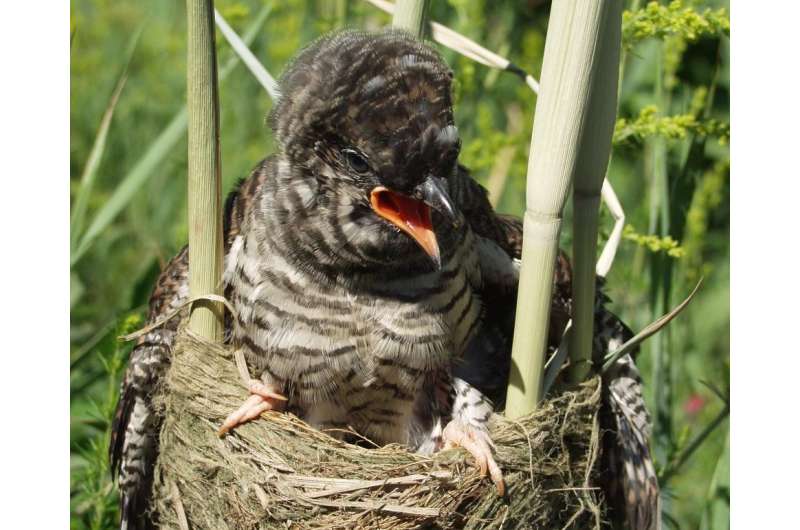Common Cuckoos can distinguish the calls of their neighbors from a stranger's

Male cuckoos appear to have a unique call that makes them distinguishable to and from other males. A new study appearing in Animal Behaviour shows that an individual cuckoo call may determine how a male responds to an interloper in his territory—behaving more tolerantly towards neighbors and more aggressively towards strangers.
Common cuckoos, Cuculus canorus, are brood parasites: they lay their eggs in the nests of other bird species, and let these hosts incubate their eggs and feed and rear the nestlings. Although cuckoos do not show parental care, they demonstrate complex social behavior, including territoriality and male-male aggression. Cuckoos have a well-known and simple two-phrase call ("cu" and "coo"), uttered by males during the breeding season. Previous studies have suggested that the "cu-coo" call of males is individually unique, allowing discrimination between different classes of males.
Researchers in central Hungary used playback experiments in a dense population of radio-tagged cuckoos to test whether neighboring males are tolerated more than unfamiliar intruders: the classic "dear enemy" phenomenon. The birds responded more aggressively to the calls of unfamiliar simulated intruders (strangers) than to the calls of conspecifics with whom they shared territorial boundaries (familiar neighbors). Cuckoos reacted within less than half a minute on average; they often approached the loudspeaker to within 5 to 10 meters from up to 80 meters away, and used their "cu-coo" calls in response. The birds used their simple call for the discrimination of familiar and unfamiliar individuals, and did so specifically to defend their own territories. In turn, they showed tolerance to nearby conspecifics, such as neighbors with overlapping territories. Since more than one cuckoo was interested in the playbacks, this study also confirmed the opportunity for brood-parasitic birds to socialize during the breeding season.
One of the study authors, Dr. Mark Hauber, Professor of Psychology, Hunter College, and Interim University Vice Provost for Research, City University of New York (CUNY), said, "This study is exciting for two reasons—it shows that brood parasitism is not an alternative for complex social dynamics in territorial birds. Also, song learning is not required for recognizing friends from enemies."
Future studies may examine the importance of individual call recognition, determine which parameter of the cuckoo call makes it unique, and clarify whether multiple overlapping territories, quasi "cuckoo hotspots," are related to the presence of female cuckoos or driven by available host nests.
Journal information: Animal Behaviour
Provided by The City University of New York



















